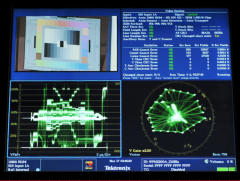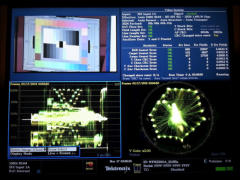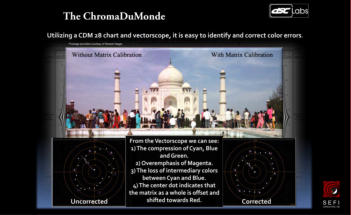

© 2015 SEFI Consulting, Inc. All rights reserved.












Contact SEFI Consulting for professional video camera tuning and calibration.
The Path to Accurate, Vivid, Matching Color
In order to illustrate one of the critical methods we use in correctly calibrating the color matrix (also often known as the linear matrix or user matrix) of the cameras within a church video system, we have here shared actual measurements taken from an actual camera tuning job in 2015. The graphics presented are actual photographs of vectorscope and waveform monitor displays taken during the tuning session. The vectorscope close-up on the top left and the overall scope view on the top right are Camera A after being correctly calibrated for the desired color response. Note the camera was correctly white balanced both before and after this calibration. The vectorscope close-up to the left (middle) was the over-saturated and distorted color response of Camera B as it was “when we found it.” This camera was still correctly white balanced! After resetting to default settings, the response was much better, but still incorrect and still not matching Camera A. This response (after resetting to defaults) is shown on the middle overall scope and waveform monitor view to the right. After carefully calibrating Camera B for the desired color response and saturation to optimally match Camera A, we verified the match and the calibration by overlaying the live response for Camera B with the stored response of Camera A. This overlay is shown on the close-up of the vectorscope on the bottom left and on the overall scope view on the bottom right. Be sure to notice how the cameras are both very closely calibrated and a very nearly perfect color match. Saturation is spot-on, and colors are accurate!Gamma
The gamma curve applied in a video camera is a crucial setting when matching multiple cameras of different models. The measurements shown to the left illustrate two cameras with identical (and correct) white balance which have very different gamma curve values. This is one of many parameters that must be carefully optimized and balanced, especially for less-than-ideal lighting situations and church video installations with multiple cameras of various models from different manufacturers.For Striking Video, White Balance Is Only the Beginning
There is much more involved in achieving vibrant, accurate, and matching video camera pictures than just setting white balance and shooting the services. Without proper tuning and calibration, multiple cameras that are white balanced identically will still vary considerably as the program is switched from camera to camera. SEFI Consulting uses the specialized instruments and techniques needed to get the very best from your video cameras. Our experts will tune each camera for optimum color performance, carefully matching the cameras in your system and optimizing critical parameters such as master black (pedestal), gamma, saturation, knee, linear matrix, phase rotation, dynamic range stretch or compression, back focus, and many more. The result is striking video - the very best of which your cameras are capable.






Click for close-up
Camera A, after tuning
Camera B, as we found it
(but white balance is correct)
Cameras A & B, overlayed after tuning
Camera A, after tuning
Camera B, after reset to defaults
Cameras A & B, overlayed after tuning
Click to Expand





© 2015 SEFI Consulting, Inc. All rights reserved.

Contact SEFI Consulting for professional
video camera tuning and calibration.
The Path to Accurate, Vivid,
and Matching Color
In order to illustrate one of the critical methods we use in correctly calibrating the color matrix (also often known as the linear matrix or user matrix) of the cameras within a church video system, we have here shared actual measurements taken from an actual camera tuning job in 2015. The graphics presented are actual photographs of vectorscope and waveform monitor displays taken during the tuning session. The vectorscope close-up on the left and the overall scope view on the right are Camera A after being correctly calibrated for the desired color response. Note the camera was correctly white balanced both before and after this calibration. Next, the vectorscope close-up to the left (below) was the over- saturated and distorted color response of Camera B as it was “when we found it.” This camera was still correctly white balanced! After resetting to default settings, the response was much better, but still incorrect and still not matching Camera A. This response (after resetting to defaults) is shown on the overall scope and waveform monitor view to the right (below). After carefully calibrating Camera B for the desired color response and saturation to optimally match Camera A, we verified the match and the calibration by overlaying the live response for Camera B with the stored response of Camera A. This overlay is shown on the close-up of the vectorscope on the bottom left and on the overall scope view on the bottom right. Be sure to notice how the cameras are both very closely calibrated and a very nearly perfect color match. Saturation is spot-on, and colors are accurate!Gamma
The gamma curve applied in a video camera is a crucial setting when matching multiple cameras of different models. The measurements shown below illustrate two cameras with identical (and correct) white balance which have very different gamma curve values. This is one of many parameters that must be carefully optimized and balanced, especially for less-than-ideal lighting situations and church video installations with multiple cameras of various models from different manufacturers.For Striking Video, White Balance
Is Only the Beginning
There is much more involved in achieving vibrant, accurate, and matching video camera pictures than just setting white balance and shooting the services. Without proper tuning and calibration, multiple cameras that are white balanced identically will still vary considerably as the program is switched from camera to camera. SEFI Consulting uses the specialized instruments and techniques needed to get the very best from your video cameras. Our experts will tune each camera for optimum color performance, carefully matching the cameras in your system and optimizing critical parameters such as master black (pedestal), gamma, saturation, knee, linear matrix, phase rotation, dynamic range stretch or compression, back focus, and many more. The result is striking video - the very best of which your cameras are capable.






Click for close-up
Camera A, after tuning
Camera B, as we found it
(but white balance is correct)
Cameras A & B, overlayed after tuning
Camera A, after tuning
Camera B, after reset to defaults
Click graphic to expand













